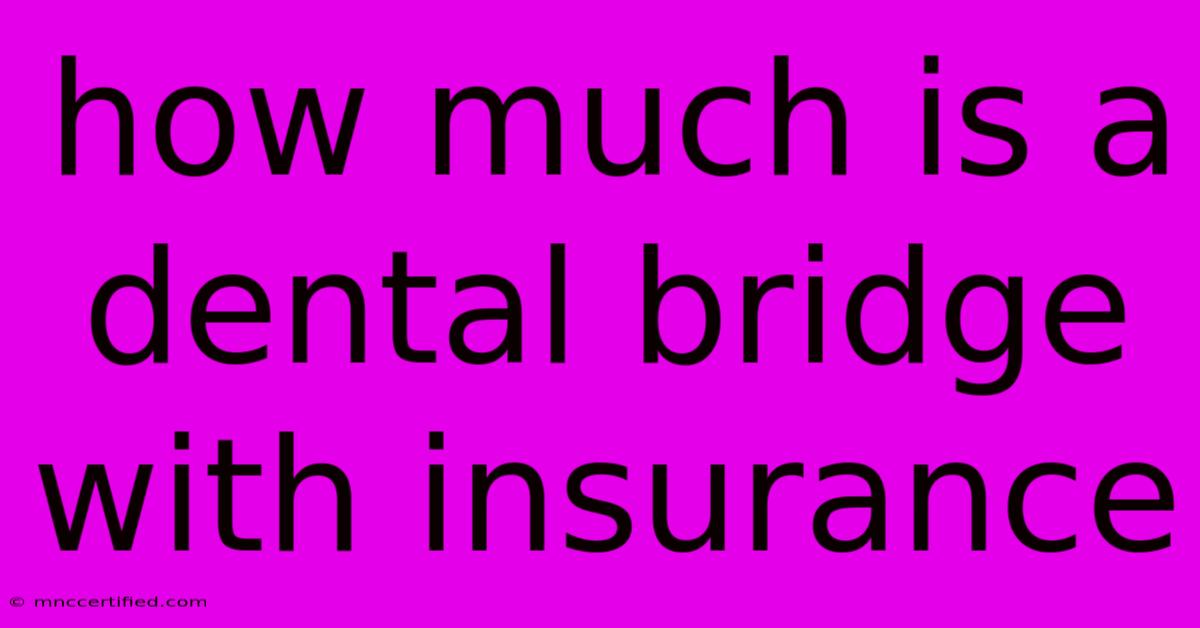How Much Is A Dental Bridge With Insurance

Table of Contents
How Much is a Dental Bridge With Insurance?
A dental bridge can be a great solution for replacing missing teeth, but the cost can vary greatly depending on factors like the type of bridge, the materials used, and your insurance coverage. In this article, we'll break down the cost of dental bridges with insurance, the different types of bridges available, and what you can expect to pay out of pocket.
Understanding Dental Bridge Costs
The cost of a dental bridge without insurance can range from $1,000 to $5,000 or more per tooth. Several factors influence the price, including:
- The type of bridge: Traditional bridges, cantilever bridges, and Maryland bridges all have different costs.
- The material used: Bridges can be made from gold, porcelain, or a combination of both.
- The number of teeth being replaced: The cost increases with the number of missing teeth.
- The complexity of the procedure: Bridges requiring extensive preparation or specialized techniques can cost more.
Dental Insurance Coverage for Bridges
Your dental insurance policy will likely partially cover the cost of a dental bridge. However, coverage varies widely depending on your plan. Here's what you need to know:
- Deductibles: You may have to pay a deductible before your insurance starts covering the cost.
- Coinsurance: After meeting your deductible, you'll typically pay a percentage of the remaining cost.
- Annual maximums: Most dental plans have an annual maximum amount they will pay out.
- Exclusions: Some plans may exclude certain types of bridges or materials.
It's crucial to review your dental insurance policy to understand your coverage limitations and expected out-of-pocket costs. Contact your insurance provider or a dental professional for a more accurate estimate.
Types of Dental Bridges
Understanding the different types of bridges can help you determine which option is best for your situation and budget:
- Traditional Bridges: This common type utilizes crowns on the teeth adjacent to the gap to support the replacement tooth. These are typically made from porcelain or gold.
- Cantilever Bridges: Used when only one tooth needs replacement, this type uses a single crown on the adjacent tooth to support the replacement tooth.
- Maryland Bridges: Also known as resin-bonded bridges, these use a small, tooth-colored resin frame that attaches to the back of the adjacent teeth. They are less invasive than traditional bridges but might not be as strong.
Tips for Saving Money on Dental Bridges
While insurance can help offset the cost, consider these tips to potentially save money on your bridge procedure:
- Shop around for dentists: Prices can vary between dental practices.
- Ask about payment plans: Some dentists offer payment plans or financing options.
- Maintain good oral hygiene: Preventative care can help you avoid the need for bridges in the future.
Remember, your dental health is crucial. Replacing missing teeth with a dental bridge can improve your bite, speech, and overall well-being. By understanding the cost and coverage options, you can make informed decisions about your dental care.

Thank you for visiting our website wich cover about How Much Is A Dental Bridge With Insurance. We hope the information provided has been useful to you. Feel free to contact us if you have any questions or need further assistance. See you next time and dont miss to bookmark.
Featured Posts
-
Memecoins Outperform As Trump Wins Election
Nov 07, 2024
-
Uk Leader Backs Foreign Secretarys Trump Callout
Nov 07, 2024
-
Prop 36 California Theft Law Changes
Nov 07, 2024
-
National Investors Title Insurance Company
Nov 07, 2024
-
Boardmasters Festival Security Measures For 2025
Nov 07, 2024